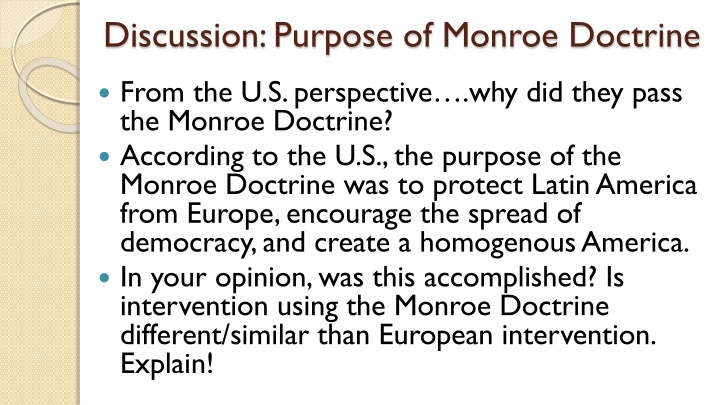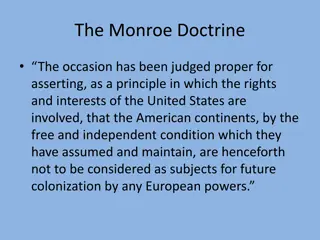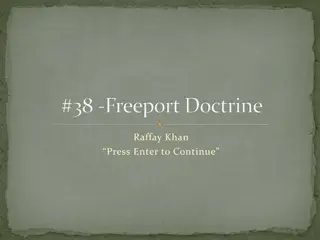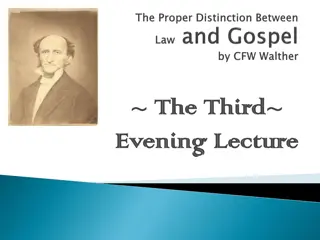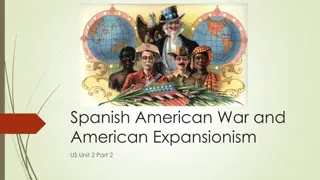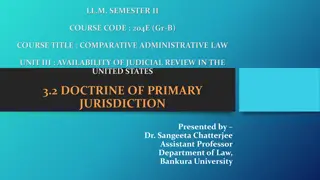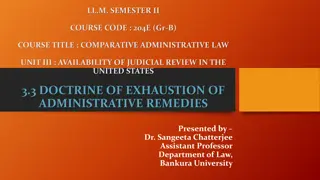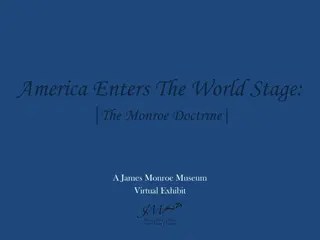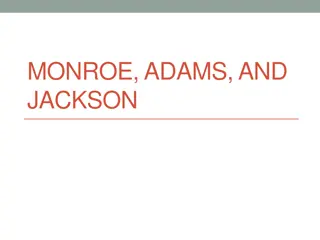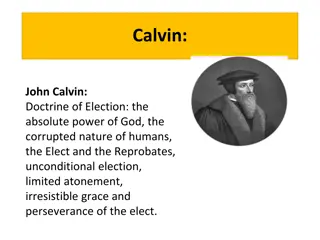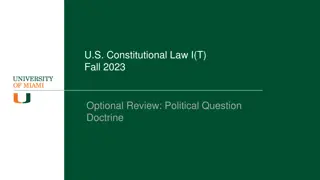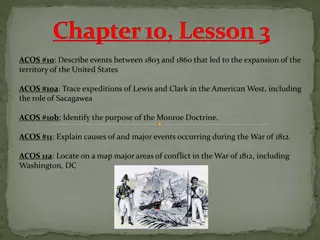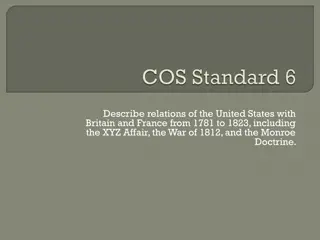Discussion: Purpose of Monroe Doctrine
Explore the purpose and impact of the Monroe Doctrine from the U.S. perspective, examining its goals, interventions, and relation to European actions in Latin America. Delve into President Monroe's background and the Doctrine's historical significance.
Download Presentation

Please find below an Image/Link to download the presentation.
The content on the website is provided AS IS for your information and personal use only. It may not be sold, licensed, or shared on other websites without obtaining consent from the author.If you encounter any issues during the download, it is possible that the publisher has removed the file from their server.
You are allowed to download the files provided on this website for personal or commercial use, subject to the condition that they are used lawfully. All files are the property of their respective owners.
The content on the website is provided AS IS for your information and personal use only. It may not be sold, licensed, or shared on other websites without obtaining consent from the author.
E N D
Presentation Transcript
Discussion: Purpose of Monroe Doctrine From the U.S. perspective .why did they pass the Monroe Doctrine? According to the U.S., the purpose of the Monroe Doctrine was to protect Latin America from Europe, encourage the spread of democracy, and create a homogenous America. In your opinion, was this accomplished? Is intervention using the Monroe Doctrine different/similar than European intervention. Explain!
Background of President Monroe Washington's Minister to France Jefferson appointed Monroe to negotiate the purchase of the entire Louisiana Territory Under Madison, he served as Secretary of State and Secretary of War. Monroe brought a vision of an expanded America to his presidency a vision that helped facilitate the Monroe Doctrine. The Monroe Doctrine influenced foreign relations for the next several decades. http://cdn.history.com/sites/2/2013/12/monroe_portrait.jpg
The Monroe Doctrine December 2, 1823 Efforts by European nations to colonize land or interfere with states in North or South America would be viewed as acts of aggression, requiring U.S. intervention. Also stated that the United States would neither interfere with existing European colonies nor meddle in the internal concerns of European countries. The Doctrine was issued at a time when nearly all Latin American colonies of Spain and Portugal had achieved independence (except Cuba and Puerto Rico)
Monroe Doctrines Usage Against Russia s expansion into NW U.S. Against Spanish/English interest in the Yucatan Peninsula Warn Spain to stay out of Dominican Republic Against the involvement of France in Mexico Against European interest to build the Panama Canal Against British involvement in disputes between Venezuela and British Guiana Military intervention in Dominican Republic, Haiti, Nicaragua, Cuba and Puerto Rico
Note Check: Monroe Doctrine Review your partner s notes, and consider the following: Are their notes summarized? Too detailed? Too wordy? In their own words? Or just copied sentences? Do their notes encompass the main idea of the Monroe Doctrine? Or is there too much extra information? Are their notes organized into topics? Or is it just a list of things? What could be done to improve organization? Be ready to discuss: One thing they did well One thing they could improve
Studying History Using Perspective In IB History, it is extremely important to look at events from multiple perspectives. The next two lessons will focus on how countries around the world teach the Monroe Doctrine. Today, you will read excerpts from the book History Lessons: How Textbooks from Around the World Portray U.S. History. As you read the introduction, I would like you to annotate the section. What are annotations? Annotations are another note-taking method used in IB history to increase understanding. They are typically a note of explanation or comment added to a text. After you finish, we will participate in a discussion activity regarding this reading so be ready to discuss!
Sample Annotations: International Response to Monroe Doctrine Because the U.S. lacked both a credible navy and army at the time, the doctrine was largely disregarded internationally. Prince Metternich of Austria was angered by the statement, and wrote privately that the doctrine was a "new act of revolt" by the U.S. The doctrine, however, was met with unspoken British approval. They enforced it tactically as part of the wider Pax Britannica, which included enforcement of the neutrality of the seas. Fast-growing British industry sought markets for its manufactured goods, and, if the newly independent Latin American states became Spanish colonies again, British access to these markets would be cut off by Spanish policy.
Now its your turn! Annotate the introduction section of the packet. Do not move ahead!
Why do other countries learn so much U.S. history, while U.S. citizens seem to know relatively little about other countries?
How do U.S. history textbooks compare with other countries? Do you like the U.S. method or is there a better alternative?
What is comparative history? Why is this an effective way to study historical events?
1. Why do other countries learn so much U.S. history, while U.S. citizens seem to know relatively little about other countries? 2. How do U.S. history textbooks compare with other countries? Do you like the U.S. method or is there a better alternative? 3. What is comparative history? Why is this an effective way to study historical events?
BELLWORK: 8/19 Today we will continue skill-building with tips for studying history in the IB program. To start, read the handout and respond to the following questions: 1. Why is it important to study history? 2. According to the reading, why is history not a popular subject in U.S. schools? Do you agree with their reasoning? 3. What is mythistory? Have you seen examples of this in past history classes? 4. How is IB history different than traditional history courses?
Skill Building: Studying History for the International Baccalaureate Perspectives of the Monroe Doctrine
The Monroe Doctrine A Study of Perspectives You will now read the Monroe Doctrine chapter from the textbook. This chapter focuses on how it is taught in: Great Britain Brazil The Caribbean Mexico As you read this chapter, take mind map notes on how each country explains the justifications for the Monroe Doctrine! Be ready to discuss the truth of the Monroe Doctrine s purpose and usage.
Monroe Doctrine Partner Discussion Now that you ve completed a comparative study of the Monroe Doctrine and it s varying perspectives, I want you to make some conclusions! With a partner, discuss the following: In your opinion, what was the purpose of the Monroe Doctrine? Which country s viewpoint of the Doctrine do you agree or sympathize with the most? Why? Which country s viewpoint of the Doctrine do you agree or sympathize with the most? Why?
